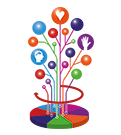The principles of active reading form five distinct phases. Each phase has its own added value in the overall reading process. Take a closer look at the five phases of the reflective cycle of active reading.
1. Selection / Inventory
Every student, manager and researcher spends an immense amount of time going through piles of literature and other written sources. You should be able to keep track of relevant articles, newspapers, books and reports on a more or less permanent basis. It is impossible to read everything that is published even on relatively limited areas of research. Effective reading, therefore, requires selection of sources. Making good use of libraries and databases is a vital prerequisite for informed selections.
2. Identify / Structure
Effective reading always necessitates that you have an idea about why you read the material. A good insight into the structure of a book, or the nature of an article, can considerably shorten the reading time.
3. Choice technique
Because your reading can serve so many simultaneous aims and functions, different reading methods need to be mastered. Reading itself often seems to function as a substitute for own independent thinking. In this case, reading is aimed primarily at reproducing or memorizing other people’s arguments. Reading without processing the information at the same time is not very effective.
4. Reading and writing
You have to work out routines to actively digest what you are reading. Reading and then thinking about what you have read should always be combined, in order to increase your understanding, and ultimately increase the degree to which you can apply and remember what you have read. It is best to do this in written form.
5. Useability
Reading can rarely be the only source of information for research, study and the development of your ideas. Reading only becomes effective when it is combined with other experiences.
Reading
The twelve Skill Sheets about Reading address real-life, practical questions and problems that you may face in your academic career. Each Skill Sheet provides you with advice and guidance on a specific area and gives you tips to improve your reading skills.
This table tells you which Skill Sheet to go to for a specific area.

